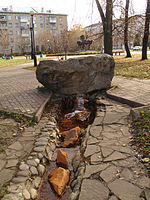True, but the retreat was hampered by a number of factors that wouldn't necessarily be the case here. For one, Napoleon stayed in Moscow longer than was advisable. For two, the Russian army was yet unbroken. For three, he was forced to retreat on the same route he advanced upon, instead of through fresh country.
Traditional but mostly false arguments debunked both by Caulaincourt and Clausewitz (both having an advantage of being both competent and being present).

There was no "advisable" period for Napoleon to stay in Moscow: staying was a purely political measure which failed and timing of that failure made further staying pointless. The problem was not in a precise timing of retreat but in retreat not being organized properly (see Caulaincourt for the details). Out of all troops only the Guards and Davout's corps had properly organized baggage train. The retreating force had been overburdened with the private carts and carriages carrying the loot at expense of provision. Only the horses of Napoleon's household (for which Caulaincourt had been responsible) got proper winter horseshoes (most of the rest had been slipping and falling on the icy roads and a lot of them fall into the Russian hands and were put to service after given the right horseshoes and fed up a little bit). Actually, even on the way to Moscow the French horses had been in a terrible shape (even in the Polish units) because there simply was no "culture" of looking after the horses: the campaigns tended to be short and high quality horses had been easily obtained in the conquered territories. Not the case in Russia because Russian peasant's horses were not suitable for a cavalry service and most of the breeding "farms" were not on the route.
Basically, the problem was systematic: routinely nothing was done without Napoleon's explicit order and only very few of his subordinates had been showing initiative.
An idea of retreating through the Southern governorships had been rejected by Clausewitz as impractical. In his opinion it would be impossible for a retreating army to provide an adequate supplies while marching across the new territories. OTOH, the big magazines had been established in Smolensk and other points along the initial route. Unfortunately, the French arrived at these points already in a state of a havoc with a resulting looting (instead of an orderly distribution) and loss of most of the stored supplies (especially flour).
As for the Russian army being "unbroken", it is tricky issue. The main army (1st and 2nd armies) almost ceased to exist after Borodino. The new troops had been raised during Napoleon's stay in Moscow but they lacked training and even weapons (huge supplies of muskets, guns and gunpowder had been left in Moscow because Kutuzov did not bother to notify governor about his plans or to move these weapons from the warehouses while retreating through the city). Even with the reinforcements arriving from the North and South (armies of Chichagov & Wittgenstein) by the beginning of the 1813 Russian army was in a terrible shape both in the terms of the losses and in the areas of food supplies, clothes, etc.
Certainly our Ottoman army would have taken very heavy losses by the time they reached Moscow, but the relatively higher population density of southern Ukraine and Muscovy compared to Lithuania and Belorus means that even a very large army could probably supply itself on the march to Moscow.
Population density of the Southern (and Left Bank in general) Ukraine was quite low due to the many decades of wars and the Tatar raids. Population of the "Ottoman" part of the Left Bank was even lower (at least part of it was intentionally kept depopulated to prevent Muscovite offensives). The Southern borders of the Tsardom had been protected by the complicated lines of fortifications created with an explicit purpose to keep possible invaders out. Then, unlike the Tatars,
the Ottoman armies did not rely on living off the land. They were routinely carrying the big supply trains with them (hence a special attention paid to the repair of the roads and bridges at least on their own territory) and, AFAIK, neither Ukraine nor Central Russia are big rice growers (rice being the major staple of the Janissary rations).
An Ottoman army annihilating the Russians in the field, capturing Moscow, and going into winter quarters would be in a much more secure position than Napoleon's unfortunate campaign.
The 1st item of the program would be rather hard to achieve (I'd say impossible because all Russian armies hardly would be concentrated in a single place and the Ottomans were not good enough to achieve that type of a victory), the 2nd even more so: they'd need to carry with them a heavy siege artillery all the way (Nappy did not) because Moscow of the XVII had been protected by the formidable fortifications. Instead of a single fortification line as, say, at Vienna, there were 3 lines (see map below)
Where exactly would they go to the winter quarters (most of the buildings being wooden the city would burn) and what they would be eating, is anybody's guess.

